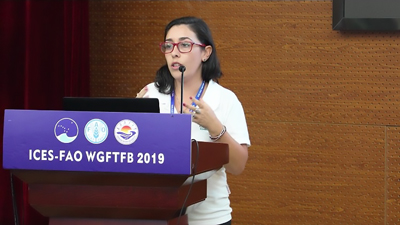Brazil team in the ICES-FAO Working Group on Fishing Technology and Fish Behavior (WGFTFB) 2019
The REBYC-II LAC team in Brazil was pleased to participate in the last meeting of the International Council for the Exploration of the Sea (ICES) and the Food and Agriculture Organization of the United Nations (FAO), for the Working Group on Fish Technology and Fish Behavior (WGFTFB) 2019 on Responsible Fishing Technology for Healthy Ecosystems and Clean Environment, held in Shanghai, China, from April 8th through 12th. The meeting was attended by experts from 34 different countries, who presented the cutting-edge research aimed at ensuring the sustainable exploitation of marine resources. Biologist Dérien Vernetti Duarte, a researcher linked to the Brazilian government (CEPSUL / ICMBio/ MMA), and a staff of the REBYC II – LAC project in Brazil, presented the recent advances achieved in Brazil on new fishing technologies aiming at mitigating the impact of shrimp trawling, by the use of bycatch reduction devices (BRD).
 Dérien Vernetti Duarte presenting in the ICES-FAO WGFTFB in a training |
ICES-FAO WGFTFB is a very important working group, which gathers several experts in the subject, and therefore, the April meeting was a wonderful opportunity for the REBYC Project in Brazil to share the progress so far achieved in reducing the impact of shrimp trawling in the country. During the meeting, it was possible to exchange experiences and to expand the network of contacts and partnerships with scientists involved in similar scientific enterprises, from North America, Europe and Asia. In most of these countries, fisheries already have specific legislation related to mitigation measures and the development of these tools is already at an advanced stage, including implementation.
The event emphasized that the search for solutions to reduce the impact of fisheries is a global target: "How to maintain an efficient fishery with the use of effective technologies in the fishery?" It also evidenced that "these technologies will work only if there is a good fisheries management system in place", corroborating the rightful focus of the REBYC-II LAC Project on fisheries management, as well as on technological development. A good example of this coupling between technology and management can be found in one of the REBYC-II LAC pilot sites in Brazil, the Environmental Protection Area (EPA) (ICMBio/MMA) of Anhatomirim, in Governador Celso Ramos, in southern Brazil, where technology-based mitigation measures to reduce the bycatch of the shrimp trawling fishery has been developed in a participatory manner, with the fishing community, becoming part of the Management Plan of the EPA.
In some countries, such as Italy and Mexico, although the use of compulsory grills has been in place for some years, there is still a great resistance to test and implement new measures. In Italy, trawl doors with new design and prototypes are being developed to reduce the fuel consumption of the vessels, which would favor the fishery due to the reduction of expenses by 10 to 15%. In Mexico, as well, technological changes in the gear have been shown to reduce fuel consumption. Although the technological changes were proven to be very beneficial in both cases, fishers are still reluctant to use them. This situation is not different from the one in Brazil, with regard to the fisher’s attitude towards the use of new devices in the shrimp trawl nets. Although the results so far achieved do show a significant reduction of the bycatch and an increased efficiency of the nets with the use of BRDs, in both small and large scale fleets, fishers remain reluctant to utilize them. To overcome this resistance, it is very important to strengthen the efforts to outreach and to include them, as much as possible, in the whole process of BRDs development. It is equally crucial, as it became clear from the presentations during the workshop, to highlight the economic gains, such as the reduction of fuel consumption, to the fishers, during the process of BRD development.
From all that was presented during the workshop, it became clear that there is no single or simple solution to improve the management of the bycatch in the shrimp fisheries, as well as to reduce the discards. Comprehensive solutions require investment in technological research as well as in the strengthening of public policies, including a better management of the fishery, with more efficient regulations, built together with all stakeholders, and Monitoring, Control and Surveillance (MCS) mechanisms in place. This conclusion reinforces the strategy for the development of the REBYC Project not only in Brazil, but in the entire region, where an overall lack of funds to finance technological research, deficiencies in enforcement and MCS shortcomings, thus hindering fisheries management, are common problems. To conclude, it is important to emphasize the importance to follow participatory approaches to promote the needed improvements in the existing fisheries management system in each country, as it has been clearly demonstrated by the REBYC-II LAC Project in the region.
